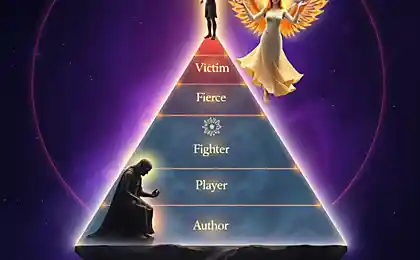23
6 Toxic Family Scenarios You May Unconsciously Repeat in Your Life
How to break the cycle and break free from destructive patterns

“A family is not merely a group of people related by blood. It is a psychological matrix that shapes our perception of the world for decades to come.
Imagine going through life, making decisions, building relationships, thinking you’re making informed choices. But in fact - like a puppet, controlled by invisible threads of childhood experiences. Sounds creepy? Welcome to the reality of the human psyche!
85%
Adults unknowingly reproduce their parents’ behavioral patterns, according to research from the American Psychological Association.
Toxic family scenarios are not just “childhood problems” that psychologists love to talk about. These are real psychological viruses transmitted from generation to generation. They control our decisions, relationships, and even our careers. The good news is that they can be detected and defused!
1Financial self-destructiveness
Symptoms: Persistent debt with sufficient income, sabotage of one’s own success, guilt for financial well-being
If your parents were constantly living from paycheck to paycheck, swearing about money and telling you that “all the rich are thieves,” congratulations: you inherited financial trauma. Now your subconscious mind is working against your well-being with a tenacity worthy of better use.
A classic example: Marina earns 150 thousand rubles a month, but every time a large amount accumulates in the account, she finds a way to spend it. A new car on credit, an expensive vacation, investments in dubious projects – anything, so as not to feel “rich” and not to betray family values.
Release plan:
- Analyze phrases about money that you heard as a child
- Create new positive attitudes about finance
- Learn the Basics of Financial Literacy – Knowledge Will Overcome Fears
- Start Small: Save 10% of your income without feeling guilty
- See a family psychologist if the sabotage continues
2 Conflict phobia or aggressive behavior

In a healthy family, conflicts are resolved through dialogue, compromise and mutual respect. In toxic - either by shouting and insulting, or by completely silencing problems. Guess which model you most likely learned?
Conflict is not war, it is negotiation. But if you haven't been taught diplomacy, you'll either run off the battlefield or use nuclear weapons against a fly.
Two extreme poles: complete avoidance of conflict (you are ready to suppress all your needs for the sake of an imaginary world) or explosive aggression at the slightest disagreement. Both options ruin the relationship with tornado efficiency.
Healthy alternative:
- Learn Nonviolent Communication Techniques by Marshall Rosenberg
- Practice “messages” instead of accusations
- Set clear boundaries in advance without waiting for an explosion.
- Learn to listen to your partner, not prepare a counterattack.
- Remember: the purpose of conflict is to find a solution, not to win.
3 Reproduction of the parental relationship model
Your brain is an amazing pattern copying machine. As a child, you absorbed, like a sponge, all the features of the relationship of parents. Now you're either repeating the role of one of them, or choosing partners similar to your parents. Even if the relationship is painful.
The paradox is that we are magnetized toward familiar patterns of behavior, even destructive ones. The subconscious prefers familiar pain to unknown happiness.
76%
People choose partners with traits similar to their parents (University of California study)
4 Emotional inaccessibility
"Men don't cry," "Don't take the garbage out of the house," "What will people think?" - familiar phrases? If in your family emotions were considered weak or indecent, you received a master class on emotional freezing.

Emotional inaccessibility is not protection, it is isolation. You build a fortress, but you find yourself in it all alone.
Symptoms of emotional freezing:
- Discomfort when expressing emotions by others
- Difficulty understanding your own feelings
- Choosing the same “cold” partners
- Solving problems only through logic
- Fear of intimacy and vulnerability
5 Perfectionism and Fear of Failure
Perfectionist parents give children a special gift: intolerance of their own mistakes. If you’ve been criticized for every mistake, humiliated for imperfection, or made unrealistic demands, you’re probably suffering from A.D. syndrome.
Irony of Perfectionism: The pursuit of the ideal paralyzes action. It is better not to do at all than to do imperfectly!
The antidote to perfectionism:
- Enter the “good enough” rule for everyday tasks
- Celebrate small victories and progress
- Studying the biographies of successful people – they all made mistakes
- Practice self-compassion instead of self-criticism
- Remember: mistakes are data for improvement, not a verdict
6 Blurring personal boundaries
In toxic families, the concept of personal boundaries is often absent. “You have nothing of your own,” “We are a family, so everything is in common,” “How can you refuse me?” – if that sounds familiar, welcome to the club of people without borders.
The lack of boundaries makes you comfortable for everyone but yourself. You don’t know how to say no, you take on other people’s problems and let others make decisions for you.
Borders are not walls for isolation, they are fences with gates. You decide who to let in and on what terms.
Boundary techniques:
- Define your values and priorities
- Learn to say no without explanation or apology.
- Set the consequences for border violations
- Don't take other people's responsibility.
- Remember, you have the right to your own opinion and time.
A universal plan to eliminate toxic scenarios
1. Awareness: Analyze your behavior patterns and connect with your childhood experiences.
2. Adoption: Don't blame your parents, they're victims of their own family scenarios.
3. Action: Begin to change your behavior small, gradually forming new habits
4. Support: Seek help from a specialist or support group
5. Patience: Change takes time – the brain is slowly rebuilding
3-5
It takes years to completely change deep behavioral patterns, according to neuropsychological studies.
Breaking the chain of toxic family scenarios is not an easy task, but it is quite doable. The main thing is to remember that you are not doomed to repeat the mistakes of previous generations. You have choices, mindfulness, and the ability to create healthy models for yourself and your future children.
Each torn toxic scenario is a gift not only to yourself, but to all future generations of your family.
Glossary of terms
Toxic family scenarios
Destructive behavior patterns passed down from generation to generation through family education and forming negative life strategies.
Behavioral patterns
Sustainable ways to respond to certain situations formed as a result of repetition and fixation in the nervous system.
Emotional inaccessibility
A psychological state characterized by difficulties in expressing and understanding emotions, establishing deep emotional connections.
Perfectionism
Psychological characteristic of the individual, expressed in the desire for impeccability of the results of activity and intolerance to their own mistakes.
Personal boundaries
Psychological limits that determine where the personality of one person ends and the personality of another begins; a system of rules for interaction with others.
Conflictophobia
Irrational fear of conflict, leading to avoidance of any disagreement at the expense of their own needs.
Material prepared by portal experts Tower based on modern research in the field of family psychology and neuropsychology. Remember, understanding a problem is half the way to solving it!























